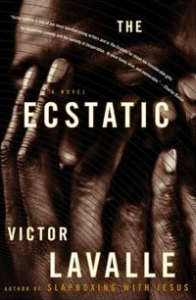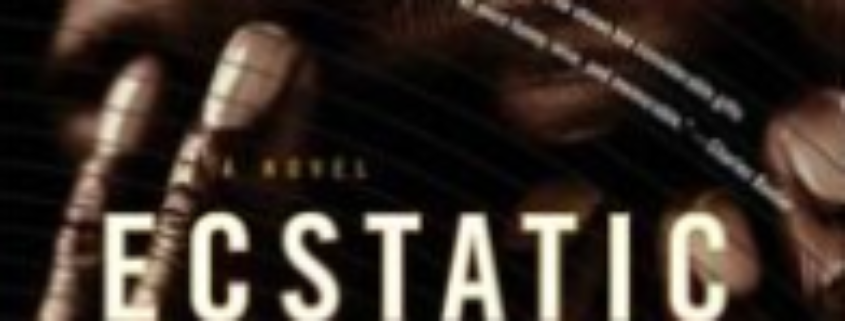Writers Read: The Ecstatic by Victor Lavelle
 The Ecstatic is Victor Lavalle’s intriguing debut novel cataloguing two months in the life of Anthony James, a 23-year-old horror-movie loving, obese, unstable, socially inept, obsessed with cleaning, sometimes-schizophrenic, college dropout. Anthony’s narrative begins on September 25, 1995, when he is abruptly rescued from “living wild in his apartment” (3) in Central New York and hauled back to the family home in South Queens by his women-folk, which include: his also sometimes-schizophrenic mother, his 93-year old tabloid aficionado grandmother, and his 13-year-old half-sister, Nabisase, a beauty-pageant debutante. Here, he is ensconced in the basement of the house for his own “safe keeping.”
The Ecstatic is Victor Lavalle’s intriguing debut novel cataloguing two months in the life of Anthony James, a 23-year-old horror-movie loving, obese, unstable, socially inept, obsessed with cleaning, sometimes-schizophrenic, college dropout. Anthony’s narrative begins on September 25, 1995, when he is abruptly rescued from “living wild in his apartment” (3) in Central New York and hauled back to the family home in South Queens by his women-folk, which include: his also sometimes-schizophrenic mother, his 93-year old tabloid aficionado grandmother, and his 13-year-old half-sister, Nabisase, a beauty-pageant debutante. Here, he is ensconced in the basement of the house for his own “safe keeping.”
Anthony, in a type of stream of consciousness conversation with the reader, narrates The Ecstatic in first person. He tells the reader about the ins and outs of his new life. The audience only ever sees the world through Anthony’s eyes. The dialogue of others is given to the reader by Anthony in hearsay. Rather than using customary dialogue techniques, employing bi-directional conversations with punctuation and quotation marks, the author begins sentences meant to convey dialogue with m-dashes. This technique has the effect of locking the reader even further in the mind of the protagonist. Scenes, which would otherwise be felt as taking place between people in casual, expectedly real world settings are, instead, narrowly focused and conveyed, unfiltered through Anthony’s mind’s eye. Add to this that Anthony’s descriptions are only “moment specific,” that is, he doesn’t give you an overview of any of the people or places he experiences, just specific (and remarkable) descriptive observations about one or two particular characteristics about them. The reader is left with a distorted view of both characters and their surroundings. Unable to gain any accuracy of perspective of what is actually going on in Anthony’s world, the reader has to live it with him on a moment-to-moment basis.
The reader lives every detail of people, places, things, and events strictly through Anthony’s incredulously fractured perspective. This tactic on the part of the author works implicitly—creating a window that appears natural into Anthony’s unsteady, erratic unnatural world.
In this manner, Lavalle never allows the reader an exit out of the protagonist’s mind. Anthony’s inner thoughts and perspectives are the reader’s only companion, the reader’s only window into the world of The Ecstatic. The reader lives every detail of people, places, things, and events strictly through Anthony’s incredulously fractured perspective. This tactic on the part of the author works implicitly—creating a window that appears natural into Anthony’s unsteady, erratic unnatural world:
We reached Baltimore –What exit? I asked my mother.
—None.
—I thought we were going to Maryland.
—Virginia. You don’t listen.
I had been to Baltimore once, that bipolar city. On one block was moderately regal Penn Station, then four blocks over a quadrant of desiccated row houses. The neighborhoods went like mood swings, good to bad, horrendous to opulent, without warning (86).
The instability and unreliability of the main character, in combination with the unusual point of view created by the author, makes reading The Ecstatic much like walking through a house of mirrors inside the mind of a madman. The reader feels trapped, disoriented; perceptions are unreliable, distorted. The overall mood is detached and effectively surreal. The Ecstatic’s first person point of view limits the exposition of the story from being seen from any other perspective other than that of the offbeat narrator’s. Lavalle peppers Anthony’s descriptions of his experiences with a multitude of peculiar, yet creatively effective similes and metaphors. This further defines the odd character of Anthony making him seem almost larger than life.
Hence, the plot of The Ecstatic is minimal, the story heavily and almost exclusively character driven. The overt tone of the protagonist as he tells his story is curiously light-hearted, almost casual, as if the crazy things he does and experiences, the social exchanges he has with secondary characters, are completely normal and expected in his world. This only adds to the air of madness that plays about the narrative.
The instability and unreliability of the main character, in combination with the unusual point of view created by the author, makes reading The Ecstatic much like walking through a house of mirrors inside the mind of a madman.
In this manner, Mr. Lavalle diligently leads the reader, through Anthony’s unconventional perspective, to the real under-story masking the overt one: though we, as a society, tend to judge and classify others based on collective, established norms of behaviors and expectations, we all may be at one point or another in our existence people whose actions and behaviors are difficult to understand, “in some way like strangers”… “people at the mercy of their minds,” or ecstatics (the title: an explanation).

The author, Victor Lavelle. Photo by E. Robateu. Courtesy of Random House.
At first, the abrupt ending of The Ecstatic may put-off the reader. Its conclusion leaves the narrative abruptly hanging, unfinished, its purpose somehow unexplained. Yet, upon reflection, it seems evident that Lavalle may have purpose, and a very surprising conclusion he hopes his audience will get as they muse and lay hidden within the folds of flesh that envelope them when they, reading, become a part of Anthony and live life through his tilted focus.
The author presents an unexpected parallel between living the human condition and the pack of feral dogs that willy-nilly roams and dominates the neighborhood. That parallel seems to indicate that whether you are young or old, rich or poor, American or foreign, black or white, male or female, perpetrator or victim, ecstatic or seemingly normal, living the human condition is like living the hard, mean, conflict-driven existence of “a dog’s life.” In The Ecstatic, and for Anthony, this implication seems to carry a double meaning, as living “a dog’s life” seems to suggest both a “dog-eat-dog world,” and/or “a dog’s life of Riley,” depending on circumstance or opportunity. “Now there really are only two ways to react to the extraordinary,” says Anthony, “The first is to ponder the grand purpose until all the fun is sucked away and the second is to enjoy it” (271).
The author seems to further clarify this meaning as the pack of feral dogs race around the neighborhood in mirror and parallel to the absurdity of the human condition of racing through life, trying to get ahead, only to start all over again:
The dogs sprinted along 145th Avenue until they reached 225th Street. There they made a right for one block, right again on 144th Avenue, down to Brookville Park, right once more to the corner of 145th and started again. A good-sized circuit. I thought some driver, at least one, would beep at the dogs and scatter them, but not one did. (271)
The Ecstatic also provides an illustration for the way society’s labels and stereotypes isolate and separate people from each other. The reader is meant to ponder whom is actually the crazier, the one who maintains and adheres to the tedium of social expectations and appears normal, or the one who, out of “madness,” chooses to disregard them altogether in favor of a more personalized, yet reviled type of freedom.
The Ecstatic also provides an illustration for the way society’s labels and stereotypes isolate and separate people from each other.
Overall, the take-away from this curiously different narrative is the fresh and innovative perspective Lavalle presents on characterization. However, for most of the narrative, The Ecstatic moves roughly, disjointedly and unreasonably between scenes retold by an unreliable and unlikeable narrator and takes too long to get to its point. Anthony is obviously intelligent, and yet he makes repeated decisions that are unwise, improper or just foolish, and the reader is forced to go along with it, or quit reading. Secondary characters are intense, in-your-face, but equally unlikeable. It is hard to have sympathy for either Anthony or the people that populate his world. And, even though the message of societal freedom versus bondage and the plight of the human condition is commendable, the message comes too late in the narrative to be truly appreciated or integrated in conjunction with the developing story.
In the end, varying degrees of annoyance at all of them undermines sympathy for the characters and their plights.


 Miriam González-Poe holds an MFA in Creative Nonfiction from Antioch University Los Angeles. Her writing has appeared in The Round-up, Culture Shôk, Fine Linen, Inner Circle, and other publications. She is currently a staff writer for Drunk Monkeys and lives in Los Angeles with her family, where she spends her time balancing the demands of the real world with her personal harmonic convergence. She is also an award-winning jewelry artist, producing works under Mac Originals.
Miriam González-Poe holds an MFA in Creative Nonfiction from Antioch University Los Angeles. Her writing has appeared in The Round-up, Culture Shôk, Fine Linen, Inner Circle, and other publications. She is currently a staff writer for Drunk Monkeys and lives in Los Angeles with her family, where she spends her time balancing the demands of the real world with her personal harmonic convergence. She is also an award-winning jewelry artist, producing works under Mac Originals.


